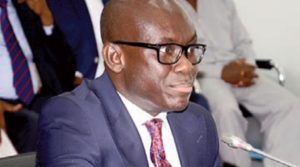Attorney-General says Parliament cannot direct School of Law to admit 499 students

Mr Godfred Yeboah Dame, the Attorney-General and Minister of Justice, Monday said Parliament does not have power using parliamentary resolutions to control the process of admission into the Ghana School of Law.
He said the mode of exercising legislative power enshrined in Article 106 of the Constitution does not admit of resolutions.
Parliament passed a resolution indicating: “The General Legal Council is, hereby, directed to proceed and admit all the students who passed in accordance with the advertised rules of the examinations.”
Parliament further directed the Attorney-General (A-G) to ensure that this resolution of Parliament is respected.
Mr Dame said as the Attorney-General, he was the leader of the Bar in Ghana, and he must see to it that the directive that 499 students who scored 50 marks were admitted was complied with.
“We do not want to get to contempt of Parliament issues,” he added.
In a statement copied to the Ghana News Agency, Mr Dame said in accordance with section 13(1)(e) and (f) of the Legal Profession Act, 1960 (Act 32), the power to regulate admission of students to pursue courses of instruction leading to qualification as lawyers and to hold examinations, which may include preliminary, intermediate, and final examinations had been vested in the General Legal Council (GLC).
“It is correct that Section 1(5) of Act 32 stipulates thus: The Council shall in the performance of their functions comply with any general directions given by the Minister,” he said.
Mr Dame said, in his opinion, the provision underscored the capacity of the Executive not the Legislature, through the Minister responsible for the GLC; thus the Attorney-General and Minister of Justice, to direct and advise the Council on major matters of national importance.
“In that regard, it was pertinent to indicate that by a letter dated October 18, 2021, received at my office on 21 October 2021, His Excellency the President forwarded the contents of a petition by the ‘499 candidates’ to me for my comments in order to enable him to respond,” he said.
Another petition dated October 20, 2021, by the National Association of Law Students was also delivered to the President.
Mr Dame said but upon delivery of his comments on the matters raised in both petitions and following further consultations “with my good self, by a letter dated October 26, 2021, received at my office on October 27, 2021, the President directed me to, pursuant to section 1(5) of Act 32…, to make the necessary intervention to the General Legal Council, on behalf of the 499 students, to address the issue.”
“Within the constraints of the law, I am following up on the directive of the President to make the necessary interventions on behalf of the 499 students,” the A-G said.
Mr Dame said it was imperative to correct a few erroneous impressions contained in the impugned Parliamentary resolution of 29th October 2021.
“The Ghana School of Law did not state a pass mark of 50 per cent or any at all as a basis for admission. The notice stated that applicants may be granted admission if they have passed the entrance examination conducted by the GLC.
“The notice also did not state the manner in which a pass mark set by the GLC would be determined”
“It is clear therefore, that, a contention that the ‘originally announced’ or ‘advertised’ pass mark was ‘50%’, is erroneous and insupportable,” he added.
With the admission process he said the Council determines the number of candidates to be admitted to the Professional Law Course for the academic year.
The applicants may be granted admission if they have passed the written examinations organized by the GLC for the 2021/2022 Academic Year, on payment of the required fee and submission of the application form and all supporting documents required online.
Eligible candidates who attained the minimum threshold mark set by the General Legal Council would be admitted for the 2021/2022/ Academic Year to pursue the Professional Law Course.
The GLC’s notice was hinged on section 13(1)(e) and (f) of the Legal Profession Act, 1960 (Act 32), which empower the GLC to regulate admission of students to pursue courses of instruction leading to qualification as lawyers and to hold examinations, which may include preliminary, intermediate, and final examinations.
Source: GNA
